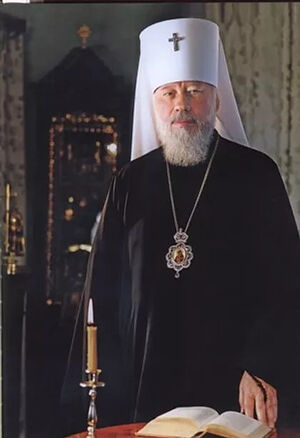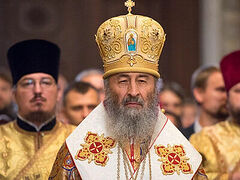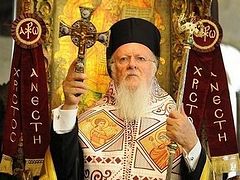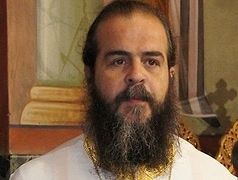 His Beatitude Metropolitan Vladimir (Sabodan) of Kiev and All Ukraine, the predecessor of the current primate of the Ukrainian Church, His Beatitude Metropolitan Onuphry, addressed the following letter to Patriarch Bartholomew of Constantinople in 2008 to thank him for participating in the celebration of the 1,020th anniversary of the Baptism of Kievan Rus’ and to elucidate his thoughts on how to overcome the ecclesiastical schism in Ukraine, asking the Patriarch for his support in the efforts made by the UOC.
His Beatitude Metropolitan Vladimir (Sabodan) of Kiev and All Ukraine, the predecessor of the current primate of the Ukrainian Church, His Beatitude Metropolitan Onuphry, addressed the following letter to Patriarch Bartholomew of Constantinople in 2008 to thank him for participating in the celebration of the 1,020th anniversary of the Baptism of Kievan Rus’ and to elucidate his thoughts on how to overcome the ecclesiastical schism in Ukraine, asking the Patriarch for his support in the efforts made by the UOC.
A similar letter was sent to the primates of the all the Local Churches.
It is worth noting that Patriarch Bartholomew visited Ukraine at that time by invitation of His Holiness Patriarch Alexiy II of Moscow and All Russia, as Ukraine is the canonical territory of the Russian Orthodox Church.
During his toast at the official banquet hosted by Metropolitan Vladimir on July 27, Patriarch Bartholomew addressed the Ukrainian primate, saying, “Most reverend beloved brother Metropolitan of Kiev, our presence here after the generous invitation of His Beatitude, Patriarch Alexiy and His Excellency, President YUSHCHENKO…” The text of this speech has either been moved or removed altogether from the Patriarchate of Constantinople’s website.
During the same trip to Ukraine, he also explicitly acknowledged that Ukraine is the canonical territory of the Russian Church, explaining that Ukraine “was under the Ecumenical Patriarchate's canonical jurisdiction for seven centuries, that is, from the baptism of the Grand Duchy of Kiev (988) until her annexation under Peter the Great (1687) to the Russian state.”
In justification of the anti-canonical invasion of the ecclesiastical territory of Ukraine in 2018, the Patriarchate of Constantinople has revised this history, claiming that Patriarch Bartholomew visited Ukraine without any invitation, and that the Kiev Metropolis was never transferred to the Russian Church.
In his letter, Metropolitan Vladimir strongly denounces any idea of creating parallel jurisdictions in Ukraine, as this would only increase nationalistic sentiments and strengthen the ugly battle for Church property. And in any case, it would not heal the schism, he writes. He also expresses the UOC’s readiness to participate in a Churchwide discussion on the matter.
As we see from events in Ukraine since Patriarch Bartholomew created the “Orthodox Church in Ukraine” in 2018, against the plea here expressed by Metropolitan Vladimir and the fullness of the UOC, Metropolitan Vladimir was completely correct in his foresight.
This letter was recently shared on Facebook by His Eminence Archbishop Jonah of Obukhov of the UOC, who notes that people today try to make Metropolitan Vladimir out to be a champion of Ukrainian autocephaly, whereas this letter reveals that he held the same view as the UOC today—that the schism in Ukraine must be overcome first.
Furthermore, a document recently published online by Alexander Drabinko, previously a canonical bishop of the UOC who joined the OCU at the “unification council” in December 2018, who was personally very close to Metropolitan Vladimir, shows that Patriarch Bartholomew was already in negotiations in 2008 to create a parallel jurisdiction in Ukraine by making the “Kiev Patriarchate” an autonomous Church. In fact, the document is dated July 27, 2008—exactly the same time that Patriarch Bartholomew was in Ukraine.
***
TO HIS ALL-HOLINESS
BARTHOLOMEW
ARCHBISHOP OF CONSTANTINOPLE—NEW ROME
AND ECUMENICAL PATRIARCH
Your All-Holiness, beloved Brother and Concelebrant in the Lord!
On behalf of the fullness of the Ukrainian Orthodox Church, we again sincerely thank you for participating in the celebrations held in the capital of Ukraine to mark the 1,020th anniversary of the Baptism of Kievan Rus’. Our meeting and fraternal prayer and Eucharistic communion again testified that we are united and that we cherish the gift of unity, following the word of the Lord: That they all may be one; as thou, Father, art in me, and I in thee, that they also may be one in us (Jn. 17:21). Based on this Gospel commandment, the holy Local Churches develop their relations such that the diversity of approaches to the problems of modern Church life does not detract from the unity and love commanded by the Savior.
One of the problems that painfully affects the life of the entirety of Universal Orthodoxy is the ecclesiastical schism in Ukraine. We are deeply convinced that this problem can only be resolved by the conciliar mind of all the Local Orthodox Churches. For our part, we testify to our readiness to participate in a Churchwide discussion on the question of the ecclesiastical division in Ukraine.
Having acquired the status of a self-governing Church with the rights of broad autonomy within the Moscow Patriarchate, the Ukrainian Orthodox Church is now demonstrating consistently high growth dynamics. Today, our Church numbers more than 11,000 communities, united in forty-three dioceses governed by fifty-give bishops (forty-three ruling bishops and twelve vicars). More than 9,000 clergy serve in obedience in the Ukrainian Orthodox Church, and there are more than twenty active academic institutions (one academy, seven seminaries, and twelve schools). About 5,000 monastics labor in more than 200 monasteries.1
The wound of schism inflicted upon the Church Body in the early 1990s is gradually being healed. The Ukrainian Orthodox Church is in dialogue with the “Ukrainian Autocephalous Orthodox Church.” Regular talks are held with representatives of the “Kiev Patriarchate.” We hold these dialogues with the unrecognized church communities, moved by the spirit of Christian love, which seeketh not her own, is not easily provoked, thinketh no evil; Rejoiceth not in iniquity, but rejoiceth in the truth; Beareth all things, believeth all things, hopeth all things, endureth all things (1 Cor. 13:5-7).
Following these words of the holy apostle Paul, the Council of Bishops of the Ukrainian Orthodox Church, gathered in the Holy Dormition-Kiev Caves Lavra on December 21, 2007, called upon the faithful children of our Church to “to treat those of our brothers and sisters who, we believe, are temporarily outside the saving enclosure of the Church, with Christian love, without hostility.”
Complete support for such a pastoral approach to resolving the problem of the schism in Ukrainian Orthodoxy was also expressed by the fullness of the Russian Orthodox Church, whose Council of Bishops “endorsed the efforts of the Ukrainian Orthodox Church to overcome the schism through dialogue with those who have fallen away from communion with it” (Definition of the Council of Bishops of the Russian Orthodox Church, June 24-29, 2008, “On the Unity of the Church”).
Based on the above, we entreat Your All-Holiness and the holy Church of Constantinople, which you lead, to support the efforts of the Ukrainian Orthodox Church aimed at restoring Church unity in our country.
The problem of the schism is also a serious concern for state and political figures in Ukraine. Several times, driven by a noble impulse to help the cause of unity, they have proposed and still propose various models for the restoration of unity. However, these models do not always correspond to Orthodox ecclesiology and the norms of canon law.
The Ukrainian mass media has recently been discussing a scenario for resolving the Ukrainian ecclesiastical issue by means of creating several parallel Orthodox jurisdictions in Ukraine.
We dutifully declare that this method of solving the problem is unacceptable, inasmuch as it:
-
contradicts the canonical principle of “one city, one bishop”
-
will increase ethnophyletistic sentiments in church communities
-
will aggravate the negative trends leading to the polarization of Ukrainian society
-
could lead to a resumption of the fierce confrontation in the fight for churches and Church property
-
will weaken the missionary potential of Orthodoxy in Ukraine amidst the activity of new religious movements and Uniatism
-
and, finally, will not solve the problem of healing the schism, as non-canonical church groups claiming autocephalous status will remain in Ukraine.
The Ukrainian Orthodox Church now carries out its salvific ministry in difficult historical conditions. At the same time, it is precisely the Ukrainian Orthodox Church that possesses the necessary potential to unite divided Ukrainian Orthodoxy and consolidate Ukrainian society. To carry out this mission, the Ukrainian Orthodox Church needs a united position from all the Local Orthodox Churches on the question of how to heal the ecclesiastical divisions in Ukraine. We hope that, enlightened by the Holy Spirit, the conciliar mind of the Universal Church will point the way to the restoration of the God-commanded Church unity.
Placing our hope in the Lord, we entreat the prayers of Your All-Holiness for the Ukrainian Orthodox Church, for its integrity and unity, for, according to the word of the holy apostle Paul, we all make up the one Body in Christ, where whether one member suffer, all the members suffer with it; or one member be honoured, all the members rejoice with it (1 Cor. 12:26).
Your All-Holiness, please accept our sincere wish of good health and God’s abundant aid in Your primatial labors for the benefit of the holy Church of Constantinople. With unwavering brotherly love in Christ for Your All-Holiness,
on behalf of the Holy Synod of the Ukrainian Orthodox Church
His Beatitude Vladimir
Metropolitan of Kiev and All Ukraine,
Primate of the Ukrainian Orthodox Church




